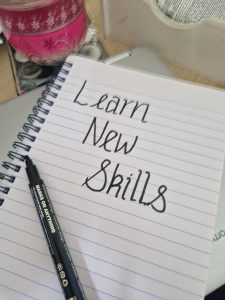5 Ways to Wellbeing: Learn New Skills

In our exploration of the 5 ways to wellbeing, we have already delved into the importance of social connections and physical activity. Now, let’s shift our focus to the significant benefits of learning new skills. Engaging in the process of acquiring new knowledge and abilities not only expands our minds but also contributes to our overall wellbeing. Here are five reasons why learning new skills is crucial for our personal growth and happiness.
- Expanding Horizons: Learning something new introduces us to unexplored territories, challenging us to step outside our comfort zones. It opens doors to fresh experiences, enabling us to discover new interests and passions. Exploring unfamiliar skills may lead to surprising revelations about ourselves and what brings us joy.
- Boosting Mental Performance: Learning stimulates our brains and enhances neuroplasticity—the brain’s ability to form and strengthen connections. By actively engaging in the process of acquiring new skills, we improve our cognitive abilities, memory retention, and problem-solving skills. Continuously challenging our minds through learning keeps them sharp and agile.
- Enhancing Confidence and Self-Esteem: Mastering a new skill instills a sense of accomplishment and self-assurance. As we develop competence in a particular area, our confidence and self-esteem grow. The progress we make along our learning journey reinforces our belief in our own abilities and strengthens our overall sense of self-worth.
- Reflective Self-Development: Learning new skills provides an opportunity for introspection and self-evaluation. By reflecting on our learning experiences, we gain deeper insight into our strengths, weaknesses, and personal growth areas. This self-awareness fosters personal development, empowering us to make intentional choices for our own betterment.
- Integrating with Social Connections and Physical Activity: Learning new skills can be a social and physically engaging endeavour. Joining a class or group to learn together promotes social connections and fosters a sense of belonging. Additionally, some skills may involve physical activity, providing an opportunity to combine learning with exercise, thereby benefiting both our mental and physical wellbeing.
It’s important to remember that the path of learning new skills may not always be smooth. There may be moments of perceived failure or setbacks along the way. However, it’s crucial to adopt a growth mindset—one that embraces challenges and views setbacks as learning opportunities. Instead of fixating on the fear of failure, ask yourself what you have gained from the experience. How can you improve? What could you do differently next time? Embracing failure as a natural part of the learning process can lead to greater resilience and personal growth.
While it’s vital to be open to learning new things and making necessary adjustments for improvement, it’s equally important to recognize our realistic limitations. The COM-B Model of behaviour change can be a helpful framework in this regard. When aspiring to learn a new skill, consider if you have the capability to perform it physically, the opportunity and resources to pursue it, and the motivation behind your desire to learn.
In summary, learning new skills is a powerful way to enhance our wellbeing. It expands our horizons, boosts mental performance, enhances confidence and self-esteem, facilitates reflective self-development, and can be integrated with social connections and physical activity. By embracing a growth mindset and understanding our realistic limitations, we can embark on a fulfilling journey of lifelong learning, enriching our lives and nurturing our overall wellbeing.

